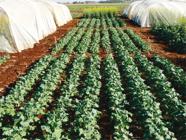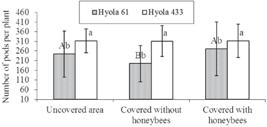In this study, performed in the western part of the state of Paraná, Brazil, two self-fertile hybrid commercial rapeseed genotypes were evaluated for yield components and physiological quality using three pollination tests and spanning two sowing dates. The treatments consisted of combinations of two rapeseed genotypes (Hyola 61 and Hyola 433), three pollination tests (uncovered area, covered area without insects and covered area containing a single colony of Africanized Apis melliferahoneybees) and two sowing dates (May 25th, 2011 and June 25th, 2011). The presence of Africanized honeybees during flowering time increased the productivity of the rapeseed. Losses in the productivity of the hybrids caused by weather conditions unfavorable for rapeseed development were mitigated through cross-pollination performed by the Africanized honeybees. Weather conditions may limit the foraging activity of Africanized honeybees, causing decreased cross-pollination by potential pollinators, especially the Africanized A. mellifera honeybee. The rapeseed hybrids respond differently depending on the sowing date, and the short-cycle Hyola 433 hybrid is the most suitable hybrid for sowing under less favorable weather conditions.
Apis mellifera ; Brassicaceae ; climatic conditions; pollinators

 Thumbnail
Thumbnail
 Thumbnail
Thumbnail
 Thumbnail
Thumbnail
 Thumbnail
Thumbnail



